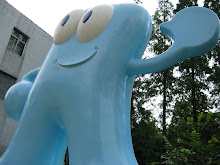I would guess that the mutual success of KTV and the chaguan are owed to the traditional structure of the Chinese family. People generally live with their parents until they get married, so there is great appeal in having a private space to escape to. Maybe people are so infatuated with sipping tea and singing love songs that the opportunity to partake in either exists within any 1 block radius, but I think more likely is that they just want to get away from home for a few hours. I’m pretty sure a private room with an etch-a-sketch and a trampoline would be equally successful if marketed properly. I wouldn’t describe singing or drinking 'cha' as my ideal way of spending a Friday night, but in keeping with my pledge to follow through on the philosophy "When in China…," I’ve ended up in both of these settings on a more than a handful of occasions.
It seems that in the domain of KTV, every Chinese person reveals their secret identity as an aspiring vocalist. If you’re one of the unfortunate souls in China who can’t sing, you’ll likely be ostracized by your peers like a Brazilian who doesn’t know how to dance. On the surface, Chinese people may mislead you into assuming that they are reserved, but put a microphone in their hand and display a bootleg music video on a giant projection screen, and you’ll open up the floodgates to some serious outpouring of heart and soul. Since nobody managed to tell me that the Chinese are petitioning the International Olympic Committee to make karaoke an official event at the 2012 Olympics, (Not really, but they do take it very seriously), I managed to embarrass myself, and my country, by my making a complete mockery of every song I attempted to recreate. After butchering such musical masterpieces as ‘Hey Jude,’ and ‘Gangsta’s paradise,’ I witnessed my Chinese counterparts clear their throats and proceed to belt out a variety of ballads, showcasing their extraordinary vocal range. During a KTV birthday party for my assistant, Penny, my American co-stars and I noticed that the majority of the Chinese contingent seemed to flee the room whenever we were singing. This was justified as their being courteous enough to step outside of the room to smoke cigarettes, but I wonder if it was just to escape the ridiculous exhibition that was taking place inside.
 My most notable experience at a chaguan took place with a Chinese coworker and her array of acquaintances, who invited Guen and me to join in a game of ‘Mafia,’ which involves imaginary murder.
My most notable experience at a chaguan took place with a Chinese coworker and her array of acquaintances, who invited Guen and me to join in a game of ‘Mafia,’ which involves imaginary murder.So the scene is as follows; Guen and I form the southwest boundary of a circle of people who identify themselves by such English names as “Do, Shrek, Spirit hunter, Pear, House, Dream,” and our coworker “Coco.” All told, there are 14 people awkwardly squeezed into a room intended to accommodate 7. Spread before us on an ill-equipped coffee table, are the usual suspects in the world of Chinese snacks, including the typical watermelon, cantaloupe, and cherry tomato trifecta. Smothering almost every other available square inch of the table are sunflower seeds, cold chicken feet, peanuts, and random stringy substances amongst a variety of herbal infusions. In the audible background, Chinese music videos compete with the steady hum of the air conditioner.
 For 3 hours, we participate in the psychological warfare that ‘Mafia’ demands, and I manage to learn and forget many new and interesting phrases like “He is the killer because he blinks too much when he talks.” By the time the fifth game comes to a close, the novelty of the situation begins to fade, and I enter a state of wonder as to how this group in their late twenties is still entertained by a game that I use as a reward for my tenth grade students when they’re on good behavior. Particularly intriguing is the absolute absence of alcohol from this gathering, other than the bottle of beer that I’ve smuggled into the premises. People have random, inexplicable outbursts of laughter that might usually be associated with intoxication, but there is nothing but herbal goodness being consumed at this party. Is it the synergy of foliage in hot water and mock violence that inspires such unadulterated amusement, or is it the universal appreciation for quality time spent with friends?
For 3 hours, we participate in the psychological warfare that ‘Mafia’ demands, and I manage to learn and forget many new and interesting phrases like “He is the killer because he blinks too much when he talks.” By the time the fifth game comes to a close, the novelty of the situation begins to fade, and I enter a state of wonder as to how this group in their late twenties is still entertained by a game that I use as a reward for my tenth grade students when they’re on good behavior. Particularly intriguing is the absolute absence of alcohol from this gathering, other than the bottle of beer that I’ve smuggled into the premises. People have random, inexplicable outbursts of laughter that might usually be associated with intoxication, but there is nothing but herbal goodness being consumed at this party. Is it the synergy of foliage in hot water and mock violence that inspires such unadulterated amusement, or is it the universal appreciation for quality time spent with friends?




No comments:
Post a Comment